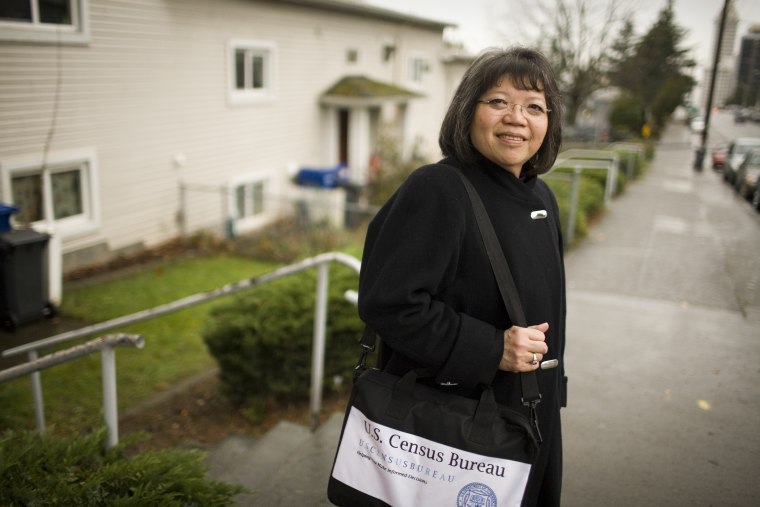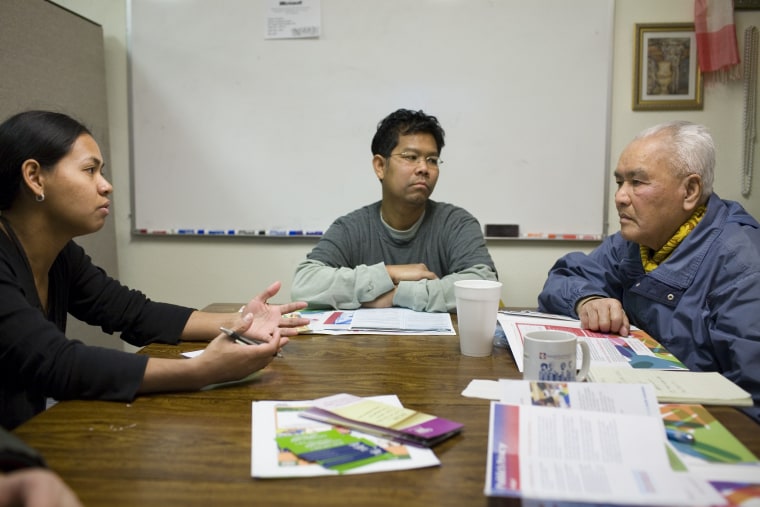Ratt Theam is sitting at a long table in the cramped offices of a Seattle-area nonprofit that normally deals with health problems in the city's immigrant communities.
But on this rainy morning Theam, who works for the U.S. Census Bureau, is not there to talk about health care. Instead her goal is to convince the three men seated at the table that it is important — and not risky — for members of Seattle’s Cambodian community to provide information for the 2010 Census.
That’s only half the battle. Theam and two other Census partnership assistants also are hoping the men will help them recruit some of the more than 1 million temporary workers the government needs to conduct the decennial survey this spring.
With 15 million people out of work nationwide, it should be fairly easy for the Census Bureau to hire even that huge number of workers. The temporary jobs promise several weeks of good pay for workers with little advanced training.
But Census officials say that even though the high unemployment rate has helped recruiting in some areas, it's done little to alleviate their toughest recruiting challenges. That’s because the Census aims to hire workers who know the language, culture and customs of every neighborhood where they plan to collect data.
“Our goal is to hire people who are reflective of the area that they serve,” said Wendy Button, chief of decennial recruiting for the Census.
In Seattle's International District, where Theam is working on this day, that may mean finding temporary workers who are comfortable conversing in Khmer, Japanese, Korean and various Chinese dialects, among other languages, and yet also have the English language and basic math skills to report the results accurately.
The Census, which occurs every 10 years, aims to get an accurate picture of the size and makeup of the U.S. population. The 2010 Census this spring will help determine how federal money is doled out for everything from fixing potholes to providing emergency services. It also helps determine how many seats in Congress each state is allotted.
1.2 million workers
Button estimates the bureau needs to recruit about 3.8 million people to take the test required to work for the Census, of which about 1.2 million will be hired. Most of those hired will spend several weeks this spring going door-to-door gathering data from people who did not return Census forms in the mail.
“If our task was just to go out and get 3.8 million (people), I’d say, hey, this is a piece of cake, even though that number is huge,” Button said.
It’s much harder to find the number of people required in every pocket of the United States, from a Polish neighborhood in Chicago to a largely Hispanic community in Los Angeles.
“Oddly enough, the difficulty in finding these highly specific (workers) has not gotten any easier with the recession,” said Sturgis Robinson, manager of the Seattle Census office. “We have tons and tons and tons of applicants — people who want to work for the Census — but they don’t necessarily possess the language and cultural affinities that we need.”
Respondents also are much more likely to open the door for someone who makes them feel comfortable, allowing for a more accurate count.
“What we want to avoid is to have people who don’t look like they belong in a neighborhood,” Robinson said.
Lily Woo, another partnership assistant in Seattle, gave the Census test to one woman who lives in Seattle’s International District and speaks Chinese well but lacks adequate English. Another man she tested had a master’s degree from a U.S. university but did not live in the neighborhood, which also isn’t ideal.
The communities where it is likely to be most challenging to recruit Census workers also are the ones where officials expect the most difficulty getting an accurate count. Census officials say they have found in past years that some minority and immigrant groups, especially those who have come from countries with oppressive governments, are wary of providing information to authorities.
That’s one major reason Census workers are spending so many months pounding the pavement and meeting with local leaders throughout the country.
At Project HANDLE, Census partnership assistants begin by explaining what questions the Census will ask, what the data will be used for and how personal information will be protected.
The goal is to reach larger groups at the local temple and other Cambodian community events, which could lead to higher participation in the Census.
The three end with a plea for help finding anyone interested in taking the Census test for a potential job.
“We would love to hire a Khmer-speaking person,” Woo said.

Duane Steffey, who worked on studies involving the 2000 Census for the National Research Council, said hiring workers from the neighborhood should boost participation.
“Community connections can be really important. There can be a personal element in motivating someone to come to feel that this is an important activity in which they ought to participate,” said Steffey, now a consulting statistician with the engineering and scientific consulting firm Exponent.
Some hiring benefit
Although the task of recruiting for some positions remains extremely difficult, Census workers say the higher rate of joblessness has helped recruiting for certain jobs and areas.
In some areas of Seattle, Woo said she has had Boeing engineers, computer programmers, professors and retired school principals show up for Census tests. One man with a master’s degree arrived in a three-piece suit, she said.
A bigger pool of available workers also has likely helped the Census recruit more skilled workers for the much smaller number of longer-term temporary Census assignments, such as Woo’s job.
The temporary Seattle office staff includes a former professional basketball player and two attorneys.
Robinson himself, who has been working for the Census on a temporary basis since November of 2008, has a resume that includes jobs with the State Department, in nonprofit leadership and as a college president.
He was unemployed when he heard about the Census position.
“I needed a job,” he said.
